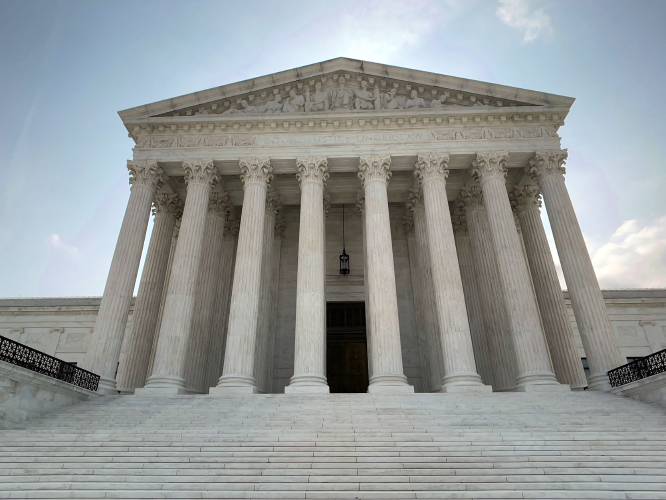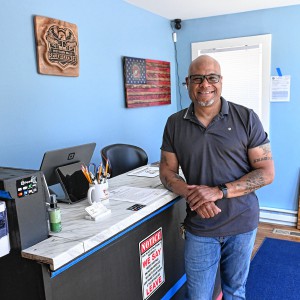My Turn: Disorder in the court — No wonder trust is low

The U.S. Supreme Court building as seen on Sunday, July 11, 2021, in Washington, D.C. DANIEL SLIM/AFP/GETTY IMAGES/TNS
| Published: 09-17-2023 6:00 PM |
News reports inform us Supreme Court Justice Clarence Thomas has repeatedly been the recipient of gifts of travel by a wealthy donor who, coincidentally, has business before the court and could therefore be seeking favorable rulings.
Thomas’ wife, Virginia, has been even more prominently in the news for involvement in support of Donald Trump’s shrill, false cry the 2020 presidential election was stolen. That her actions were in a state other than Georgia perhaps spared her from being indicted along with the 19 others who attempted to alter that state’s vote count.
Do Virginia and Clarence talk about politics over dinner? Around-the-bend right-wingers as they are, we can well imagine the content of their conversations. This expands ethics questions Clarence should answer.
Stirred by public responses that like every other division of government, the high court seriously needs to have an ethics process governing member behavior, Justice Samuel Alito stepped forward to respond. Congress, he told the Wall Street Journal, has “no authority” to regulate the Supreme Court. The essence of Alito’s arrogant comment was that the Supreme Court is a totally independent branch of government, free to interpret the Constitution in any way it wishes, its members free to behave in any way they’d like to.
It comes as no surprise that public opinion about the court is at an all-time low. Aside from the philosophical matter — that court decisions can only please the winning party — is the long history of unethical, undemocratic and unpopular decisions the court has made.
Among the Founders’ profound failures for democracy was their design of the court. Understanding that the Founders were a group of male members of a slave-owning, landed aristocracy provides insight into what they were up to — an effort to fully control this new government they were creating.
Here is a reminder civics lesson on how these men planned to control the court, and their new country. Because only landowners like themselves could vote, they assumed one like themselves would always be the president. So they had the president choose nominees for the court. Senators were not then elected. Two were selected by each state. The senators would approve the president’s choice for the court. The appointment would be for life. Thus written reads their Constitution.
Early on came a dominating power judges in federal courts could exercise — judicial review. In Marbury v. Madison (1803),the court established its power to declare actions of the other two branches of our government unconstitutional.
Article continues after...
Yesterday's Most Read Articles
 Longtime Orange public servant Richard Sheridan dies at 78
Longtime Orange public servant Richard Sheridan dies at 78
 As I See It: Between Israel and Palestine: Which side should we be on, and why?
As I See It: Between Israel and Palestine: Which side should we be on, and why?
 Retired police officer, veteran opens firearms training academy in Millers Falls
Retired police officer, veteran opens firearms training academy in Millers Falls
 Deerfield’s Tilton Library expansion ‘takes a village’
Deerfield’s Tilton Library expansion ‘takes a village’
 Big turnout expected Sunday for 14th annual WMass Mother’s Day Half Marathon in Whately
Big turnout expected Sunday for 14th annual WMass Mother’s Day Half Marathon in Whately
 High Schools: Big sixth inning propels Franklin Tech past Smith Vocational (PHOTOS)
High Schools: Big sixth inning propels Franklin Tech past Smith Vocational (PHOTOS)
Over time, senators having to be popularly elected, women taking the right to vote, and some improvement in voting rights for Blacks and other people of color have diminished favor by the court of interests of the wealthy. But as we have seen in nearly every decade, conservative appointees have delivered unpopular decisions.
In the most outrageous and controversial decision ever made, the court decided the outcome of the 2000 presidential election. Al Gore had won the popular vote by more than half a million votes, but the Electoral College count awaited Florida’s tally.
A state supreme court-ordered recount was halted after 36 days by a 5-4 U.S. Supreme Court vote making Bush the winner. An authoritative study found that had the recount been allowed to continue, Bush would likely have won, but there was never certainty. One consequence was Bush’s launching two disgusting wars.
In Shelby Co. v. Holder (2013), the white conservative majority ruled against a portion of the Congress’ 1965 landmark Voting Rights Act, negatively impacting the Kennedy administration’s effort to undo 100 years of blocked voting by Blacks and other persons of color.
The justices’ opinion, expressed in District of Columbia v. Heller (2008), was that the Second Amendment prevented the city of Washington from reducing gun violence and crime by not allowing citizens to possess guns. Twisting wording of the Second Amendment, the court ruled Heller need not be a member of a militia to own a gun.
A wiser group of “originalist” justices might have taken this opportunity to rule that the Second Amendment has been steadily misinterpreted. It allowed guns only to militias — to control slaves.
The significance of the court can be measured and more closely studied by reading Roe, Griswold, and Dobbs on rights of women; Dred Scott, Plessy, and Powell on the historic mistreatment of Blacks; Brown and Swann on school segregation; or Gideon and Miranda on rights of the accused.
The court’s present far-right majority is the creation (for life) of a racist, convicted abuser of women, and criminally indicted ex-president, beloved by millions of fools.
Charlemont resident Carl Doerner is an author and historian, currently editing his new work, “Breaking the Silence: Revisioning the American Narrative.”

 My Turn: Quabbin region will never see any benefits from reservoir
My Turn: Quabbin region will never see any benefits from reservoir Dennis Merritt: Would we support a Sanders power grab?
Dennis Merritt: Would we support a Sanders power grab? Jonathan Oltman: Thank you Carolyn Shores Ness
Jonathan Oltman: Thank you Carolyn Shores Ness MaryDiane Baker: The souls of war
MaryDiane Baker: The souls of war
